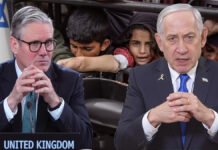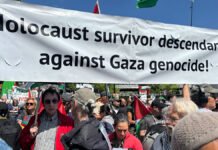Honouring the Fallen by Marching For Peace
Armistice- An armistice is a formal agreement of warring parties to stop fighting. It is not necessarily the end of a war, as it may constitute only a cessation of hostilities while an attempt is made to negotiate a lasting peace. It is derived from the Latin arma, meaning “arms” and -stitium, meaning “a stopping”.
This Armistice Day witnesses two interconnected marches converging on London – one by veterans to honour our fallen heroes. The other a peace protesters calling for Gaza’s relief. Despite distinct aims, a unifying spirit binds them – ending violence and upholding peace, an armistice.
Conveniently forgotten by many commentators this veteran’s march honours all our service personnel including those who served in Palestine some 750 of whom died amidst growing unrest from 1945-1948. As violence escalated, these soldiers found themselves stuck between competing nationalist movements they fell victim to Jewish Zionist terrorists.
During World War II, Jews and Arabs in British Mandate Palestine formed separate companies within the Royal East Kent Regiment, known as the “Buffs.” The first Jewish Infantry Company was established in 1940, with 14 more raised, totalling around 5,300 men. Their mission included security, guarding installations, and escorting convoys, though training was limited, and they had outdated equipment.
The British intention to recruit equal numbers of Jews and Arabs did not materialize. In 1942, the Palestine Regiment was formed, consisting of Jewish and Arab battalions, with 1,600 Jews and 1,200 Arabs. After World War II, the British Army became entangled in the growing conflict between Arabs and Jews in Palestine.
From the Palestine Regiment to the Oxfordshire and Buckinghamshire Light Infantry, British forces struggled to keep order as Zionist militant groups launched deadly attacks to hasten partition. Though most had only recently served in World War II, they now faced threats from Jewish insurgents like the Irgun and Stern Gang.
Amidst bombings, riots and kidnappings, Britain finally relinquished its Mandate in May 1948, leaving Palestine to descend into war. Those who gave their lives merit remembering this Remembrance Day, casualties of a chaotic withdrawal after three bitter years.
Seventy-five years on we see a protest march responding to the urgent crisis in Gaza today, where civilian casualties mount hourly. Both groups echo the ceasefire that first marked Armistice Day, rejecting brutality against any people.
Inspiring words from Rev. Tim Daplyn: "Termed a pro-Palestinian demonstration, but it's a pro-peace demonstration… old soldiers, on Armistice Day, calling for Armistice." Standing with humanity.
— Labour Heartlands (@Labourheartland) November 11, 2023
#Gaza #LondonProtest #PeaceCall pic.twitter.com/s9CDLqkigH
The need to memorialise past sacrifices makes it all the more vital that today’s gathering for peace proceed with dignity and discipline. With Gaza in crisis, thousands will march seeking Israeli restraint and de-escalation.
The protest march responds to the urgent crisis in Gaza today, where civilian casualties mount hourly. Both groups echo the ceasefire that first marked Armistice Day, rejecting brutality against any people.
Yet warmongers hope to fracture this solidarity. The Home Secretary Suella Braverman’s incendiary words describe pro-Palestine protesters as “hate marchers” and accuse police of double standards. While the pro-Palestinian peace march is not set to take place until almost two hours after the nation holds a two-minute silence, and is not due to go past the Cenotaph in Whitehall, some – including the home secretary – have branded the event offensive and inappropriate.
This has only encouraged zealots toward violence that would facilitate a political crackdown on protests. Columnists salivate at inflammatory headlines over substance.
Their cynical ploys cannot erase historical realities. If Britain honoured the fallen, it would defend all civilians equally – not ignore Palestinian plight while appeasing aggression.
Veterans should welcome, not oppose, those pleading for Gaza’s civilians. Conscience compels moral clarity from leaders, not conformity to state crimes. Let both groups unite around timeless ideals – human solidarity, opposition to oppression, and ethical dissent against the corruptions of power.
If violence can cease this Armistice Day, then commemoration and dissent will jointly illuminate the path ahead – upholding human rights for all, neither blinded by loyalty nor hostage to hatreds. Peace honours the dead by protecting the living.
In Flanders Fields
BY JOHN MCCRAE
In Flanders fields the poppies blow
Between the crosses, row on row,
That mark our place; and in the sky
The larks, still bravely singing, fly
Scarce heard amid the guns below.
We are the Dead. Short days ago
We lived, felt dawn, saw sunset glow,
Loved and were loved, and now we lie,
In Flanders fields.
Take up our quarrel with the foe:
To you from failing hands we throw
The torch; be yours to hold it high.
If ye break faith with us who die
We shall not sleep, though poppies grow
In Flanders fields.
Let us honour Britain’s fallen in Palestine while reviving the 1918 spirit of ceasefire and awakening conscience. In their name, let us demand today’s leaders pursue peace with courage. If the dead could speak, would they not plead for today’s victims as well? In their name, let ceasefires and justice prevail.
Support Independent Journalism Today
Our unwavering dedication is to provide you with unbiased news, diverse perspectives, and insightful opinions. We're on a mission to ensure that those in positions of power are held accountable for their actions, but we can't do it alone. Labour Heartlands is primarily funded by me, Paul Knaggs, and by the generous contributions of readers like you. Your donations keep us going and help us uphold the principles of independent journalism. Join us in our quest for truth, transparency, and accountability – donate today and be a part of our mission!
Like everyone else, we're facing challenges, and we need your help to stay online and continue providing crucial journalism. Every contribution, no matter how small, goes a long way in helping us thrive. By becoming one of our donors, you become a vital part of our mission to uncover the truth and uphold the values of democracy.
While we maintain our independence from political affiliations, we stand united against corruption, injustice, and the erosion of free speech, truth, and democracy. We believe in the power of accurate information in a democracy, and we consider facts non-negotiable.
Your support, no matter the amount, can make a significant impact. Together, we can make a difference and continue our journey toward a more informed and just society.
Thank you for supporting Labour Heartlands












